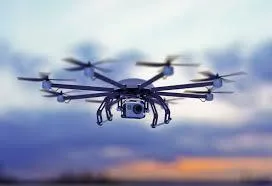Drones could replace private security guns
Turn on the tech

Experts believe drones could assist security companies in combatting crime in your neighbourhood.
Image: Supplied
BRAINS, not bullets, might be the answer to South Africa’s rising crime challenge - amid heated debate over proposed legal changes that will alter how private security firms patrol and protect.
Experts say technology and drones in particular could be the answer to the proposed amendments by the Private Security Industry Regulatory Authority (PSIRA) which could restrict the use of high-calibre firearms which many believe will leave communities more vulnerable to crime. Facial recognition features and better cameras could also feature
Kopano Tholo, a drone expert at ITOO Special Risks says these devices can be used for routine surveillance, gathering real-time data and incident response in public areas such as malls, stadiums and taxi ranks. “This could potentially assist where the proposed regulatory amendments may impact private security guards’ ability to effectively perform their duties,” he said.
In addition, he said by using drones they would have access to “extensive data” which could be used in their planning. “For instance, drones come with thermal imaging and night vision solutions. And with the thermal imaging they've got facial recognition technology. So if there's a specific suspect that they're looking for, if you have routine drone operations in specific areas it can specifically pick up the face of that person and identify what objects certain individuals are carrying. If people are carrying weapons on the ground, you know the situation on the ground.”
Tholo says the person operating the drone can feed real-time information to the head of security who then dispatches the security guards. He says major security companies are using drones and it's not unusual to see a drone flying in the area of a stadium where rugby or soccer matches and even concerts are taking place. “The security company contracted to do security surveillance of that area, crowd monitoring, is flying that drone to detect and control crowd movements and scanning the area for any mishaps which might happen on the ground.”
While drones can make a measurable difference in security operations, it also leads to questions about the use of data and privacy, which his company covers for certain business activities. “In terms of taking out an ITOO special risk drone insurance policy, we've got an invasion of privacy supplement, which we grant our clients from an operational perspective.” He says this also depends on the size of the operation and what their clients are contracted to do. “For instance, some of the companies that we currently working with probably have a fleet of about 80 to 100 drones operating at different sites all over South Africa.”
However he warns that security companies must comply with the regulations that govern the operation of commercial/ business operated drones in South Africa. This means drones used for commercial purposes must be registered with the South African Civil Aviation Authority while drone operators must have an Unmanned Aircraft System Operator Certificate and also have the necessary security rating.
Johan Berger from the Institute for Security Studies Burger says thousands of weapons are stolen from the police, the military and even large companies every year which end up in the hands of criminals. Often they are also stolen from citizens who are legal gun owners. He agrees that the proposed amendments will leave people vulnerable in a country which has the second highest crime rate in the world.
He says if the amendments go through, private security companies will be forced to “broaden” the way in which they currently use technology. “I think they will try to improvise in terms of employing whatever is available in terms of technology to make up for the lack of the kind of equipment or weapons that they are more used to in terms of their businesses. They are very creative because it's about business, it's about making money. So, they will consider spending money to make money, but in the end, their clients will have to pay for that. So, it might have a negative impact on the kind of fees that people will have to pay for these kinds of services.”
Burger says apart from drones the industry also uses advanced cameras which have been set up across the country and they have operational rooms with TV screens where they monitor cameras. “So they would have to find a balance in terms of the kind of technology that they acquire to enable them to continue providing the level of service that their clients are expecting of them.”
Mary de Haas a violence monitor and former PSIRA Board member, says while some of the amendments are needed there should be room for the industry to negotiate on others. “I'm all for tightening up on controls but there's probably room for some negotiation because a lot of the guards themselves are very exploited and a lot of those guards have got basic training but not necessarily in handling guns.”
She said while there were many security companies who followed the rule of law, many others were not registered or had criminals working for them.
“It's a crime to operate as a security industry if you're not registered and the police didn't see it as a priority to charge people for not being registered. And that is a huge problem because a lot of police also have interests in the security industry,” de Haas said.